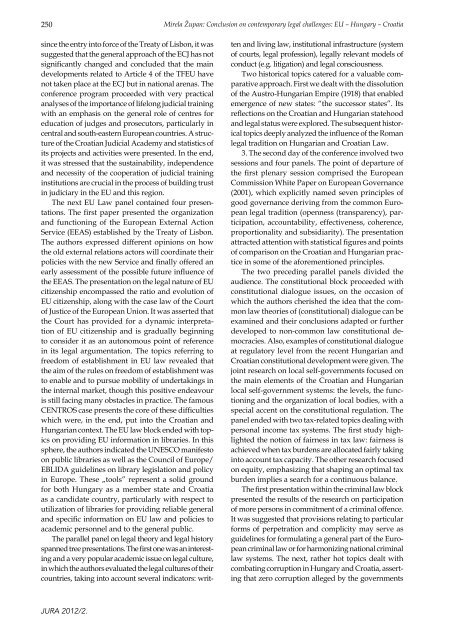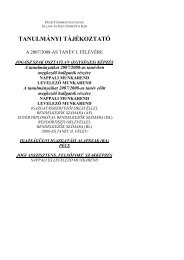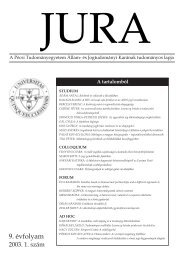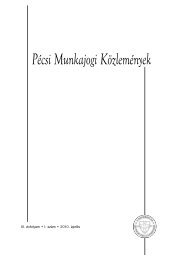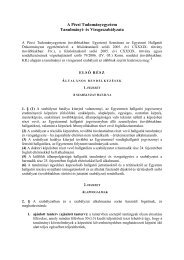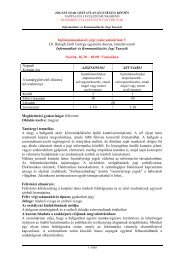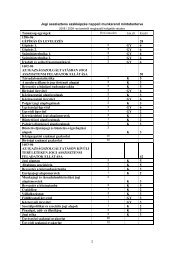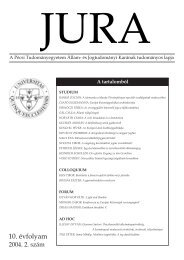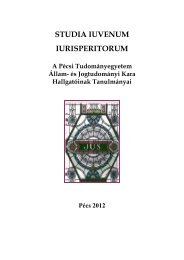2012. évi 2. szám - Jura - Pécsi Tudományegyetem
2012. évi 2. szám - Jura - Pécsi Tudományegyetem
2012. évi 2. szám - Jura - Pécsi Tudományegyetem
- TAGS
- jura
You also want an ePaper? Increase the reach of your titles
YUMPU automatically turns print PDFs into web optimized ePapers that Google loves.
250 Mirela Župan: Conclusion on contemporary legal challenges: EU – Hungary – Croatiasince the entry into force of the Treaty of Lisbon, it wassuggested that the general approach of the ECJ has notsignificantly changed and concluded that the maindevelopments related to Article 4 of the TFEU havenot taken place at the ECJ but in national arenas. Theconference program proceeded with very practicalanalyses of the importance of lifelong judicial trainingwith an emphasis on the general role of centres foreducation of judges and prosecutors, particularly incentral and south-eastern European countries. A structureof the Croatian Judicial Academy and statistics ofits projects and activities were presented. In the end,it was stressed that the sustainability, independenceand necessity of the cooperation of judicial traininginstitutions are crucial in the process of building trustin judiciary in the EU and this region.The next EU Law panel contained four presentations.The first paper presented the organizationand functioning of the European External ActionService (EEAS) established by the Treaty of Lisbon.The authors expressed different opinions on howthe old external relations actors will coordinate theirpolicies with the new Service and finally offered anearly assessment of the possible future influence ofthe EEAS. The presentation on the legal nature of EUcitizenship encompassed the ratio and evolution ofEU citizenship, along with the case law of the Courtof Justice of the European Union. It was asserted thatthe Court has provided for a dynamic interpretationof EU citizenship and is gradually beginningto consider it as an autonomous point of referencein its legal argumentation. The topics referring tofreedom of establishment in EU law revealed thatthe aim of the rules on freedom of establishment wasto enable and to pursue mobility of undertakings inthe internal market, though this positive endeavouris still facing many obstacles in practice. The famousCENTROS case presents the core of these difficultieswhich were, in the end, put into the Croatian andHungarian context. The EU law block ended with topicson providing EU information in libraries. In thissphere, the authors indicated the UNESCO manifestoon public libraries as well as the Council of Europe/EBLIDA guidelines on library legislation and policyin Europe. These „tools” represent a solid groundfor both Hungary as a member state and Croatiaas a candidate country, particularly with respect toutilization of libraries for providing reliable generaland specific information on EU law and policies toacademic personnel and to the general public.The parallel panel on legal theory and legal historyspanned tree presentations. The first one was an interestingand a very popular academic issue on legal culture,in which the authors evaluated the legal cultures of theircountries, taking into account several indicators: writtenand living law, institutional infrastructure (systemof courts, legal profession), legally relevant models ofconduct (e.g. litigation) and legal consciousness.Two historical topics catered for a valuable comparativeapproach. First we dealt with the dissolutionof the Austro-Hungarian Empire (1918) that enabledemergence of new states: “the successor states”. Itsreflections on the Croatian and Hungarian statehoodand legal status were explored. The subsequent historicaltopics deeply analyzed the influence of the Romanlegal tradition on Hungarian and Croatian Law.3. The second day of the conference involved twosessions and four panels. The point of departure ofthe first plenary session comprised the EuropeanCommission White Paper on European Governance(2001), which explicitly named seven principles ofgood governance deriving from the common Europeanlegal tradition (openness (transparency), participation,accountability, effectiveness, coherence,proportionality and subsidiarity). The presentationattracted attention with statistical figures and pointsof comparison on the Croatian and Hungarian practicein some of the aforementioned principles.The two preceding parallel panels divided theaudience. The constitutional block proceeded withconstitutional dialogue issues, on the occasion ofwhich the authors cherished the idea that the commonlaw theories of (constitutional) dialogue can beexamined and their conclusions adapted or furtherdeveloped to non-common law constitutional democracies.Also, examples of constitutional dialogueat regulatory level from the recent Hungarian andCroatian constitutional development were given. Thejoint research on local self-governments focused onthe main elements of the Croatian and Hungarianlocal self-government systems: the levels, the functioningand the organization of local bodies, with aspecial accent on the constitutional regulation. Thepanel ended with two tax-related topics dealing withpersonal income tax systems. The first study highlightedthe notion of fairness in tax law: fairness isachieved when tax burdens are allocated fairly takinginto account tax capacity. The other research focusedon equity, emphasizing that shaping an optimal taxburden implies a search for a continuous balance.The first presentation within the criminal law blockpresented the results of the research on participationof more persons in commitment of a criminal offence.It was suggested that provisions relating to particularforms of perpetration and complicity may serve asguidelines for formulating a general part of the Europeancriminal law or for harmonizing national criminallaw systems. The next, rather hot topics dealt withcombating corruption in Hungary and Croatia, assertingthat zero corruption alleged by the governmentsJURA 2012/<strong>2.</strong>


